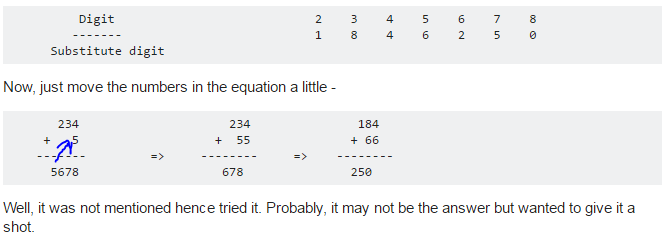Begin with a flagrantly erroneous summation and a woefully vacant substitution table.
234
+ 5 Digit 2 3 4 5 6 7 8
------- Substitute digit _ _ _ _ _ _ _
5678
How can the substitution table be filled out to correct this summation?
This is almost too easy if you just follow these guidelines.
Assign 7 unique substitute digits from
0through9for digits2through8in the table (one digit per digit)Replace digits in the summation by their substitutes in the table (no other kinds of edits, as the summation and table should be taken at face value)
All numbers and digits are decimal (no notation tricks are involved)
No leading zeros in the total or either summand
The summation has a unique solution
Added: Regular arithmetic pretty much forces the resultant summation. lateral-thinking allows the guidelines to attain it.

